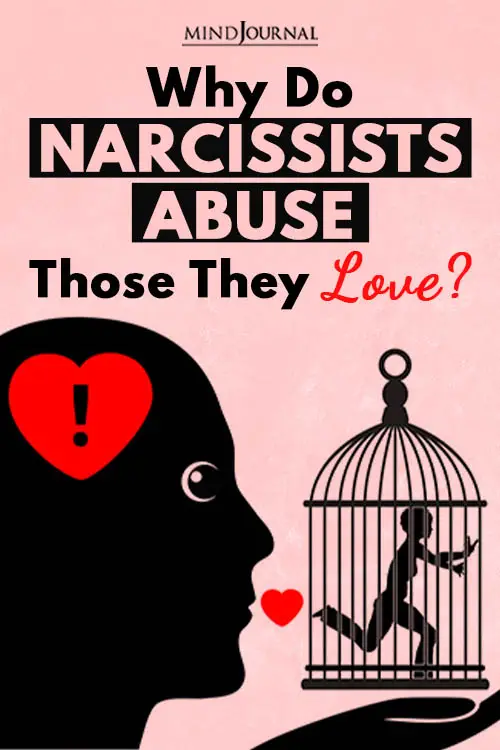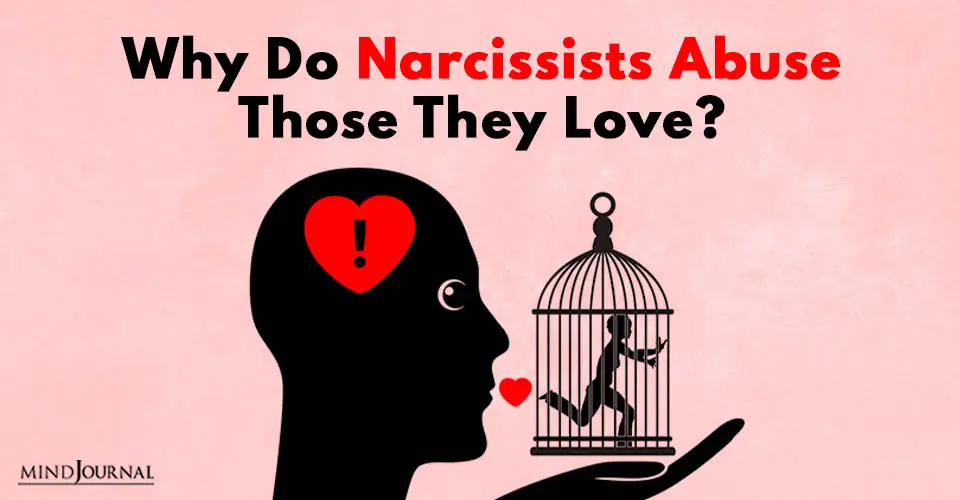Why Do Narcissists Abuse Those They Love? How to understand and predict narcissistic abuse.
By Dr. Elinor Greenberg
One of the most difficult things to understand in life is how someone who professes to love you can then go on to abuse you.
People feel traumatized and confused after a romantic relationship with an abusive narcissistic partner ends. They wonder, “We were so in love, yet he went from telling me that I was the love of his life to treating me like garbage. He cheated on me. He devalued me. He embarrassed me in front of our friends. How can I trust anyone again, if I so badly misjudged this person?”
Anyone who has been abused by a narcissistic partner may wonder how they could have made such a big mistake — and how they can avoid making it again in the future.
The good news is that most people with Narcissistic Personality Disorder are very predictable. They tend to follow the same relationship pattern again and again.
And, contrary to common perceptions about narcissists, most are not especially devious. Narcissists continually signal that they are narcissists. You can learn to recognize the early signs that a new partner is a narcissist by paying close attention to how they behave toward you at each stage of your relationship. Then it is up to you to decide if you want to continue.
Why Are Narcissists Prone to Being Abusive?
When people have a Narcissistic Personality Disorder, two things interact to predispose them to be abusive:
1. They are low on emotional empathy.
Emotional empathy is the capacity to feel what another person is feeling (or what you imagine the person is feeling).
Having emotional empathy decreases the likelihood that you will want to hurt others because you will literally feel some of their pain. Without emotional empathy, you have less motivation to pay attention to the pain that your words and actions cause a partner.
Narcissists can have “intellectual empathy” without emotional empathy. Intellectual empathy is the ability to cognitively understand that you are causing another person pain.
It requires that you stop and think about what the other person might feel in response to your actions. Narcissists, therefore, can understand that they may be causing someone pain, but they have less motivation to care because they are not feeling anything negative themselves.
Related: How The 3 Types of Narcissists Act on a First Date
2. They lack “whole object relations” and “object constancy.”
One of the main reasons why narcissists abuse those they love is that they lack whole object relations and object constancy.
Briefly defined: “Whole object relations is the capacity to see oneself and other people in an integrated and realistic way as having a mix of good and bad qualities, some that you like and others that you dislike.”
If you have whole object relations, you can accept that someone is not perfect and still value that person for the positive qualities he or she has. “Object constancy” is the ability to maintain your positive emotional connection to someone whom you care about while you are feeling angry, frustrated, disappointed, or hurt by that person.
Object constancy helps you rein in your impulses to hurt someone during a fight. Lacking it makes people more willing to emotionally and physically damage their mate.
[NOTE: Not all people with Narcissistic Personality Disorder are equally abusive. Narcissists range from those who put you on a pedestal and then verbally devalue you when they realize you are not the perfect being that they expected you to be, to people who physically abuse their mates and try and control their every move — who they can see, what they can spend money on, how often they can speak to their family, etc.]
The Three Stages of the Narcissistic Relationship Abuse Pattern
Although there are narcissists who are “players” and not looking for a serious, long-term relationship, many with narcissistic disorders do want to settle down and get married. Unfortunately, because they lack whole object relations, they tend to be unrealistic about what they expect in a mate.
They perceive two categories: perfect and flawed.
Perfect = You are pleasing me right now.
Flawed = You are doing something that I do not like right now.
As a result, instead of finding the perfect relationship that they crave, narcissists end up repeating what I call the Narcissist Relationship Abuse Pattern.
Each stage has its own form of narcissistic abuse that you can learn to spot.
STAGE 1: Chasing the Unicorn
In the beginning, you seem to like that rarest of imaginary creatures, the unicorn. They love everything about you; even your flaws seem like endearing idiosyncrasies.
Narcissists are extremists with no middle ground. When they first find you attractive, they are likely to idealize you and believe that you are the perfect mate for them.
At last, they have found someone who will never disappoint them. They give chase and pursue you with attention, gifts, texts, flattery, and anything else they think will help prove their total devotion.
In this stage, while you are slightly out of reach, and they have not yet sealed the deal, they are totally focused on convincing you to give them a chance to prove their love.
Some narcissists just repeat the “Chase Stage” over and over with different people, because they really do not know how to have an actual relationship with someone they have “caught.”
Related: Why Empaths Attract Abusive People And How To Stop It.
Abuse Pattern
After spending an enormous amount of time, energy, and sometimes money trying to convince you of their devotion, your pursuer immediately loses interest in you once you stop running. You are left feeling disappointed and bewildered that this person who said he wanted you so much has now “ghosted” you, and will not even answer your texts.
Predictors of Abuse
1) The over-the-top nature of their chase is a signal that they are unrealistic.
Unlike most people, who want to gradually get to know a person before they make commitments about the future, narcissists may try to engage you in planning your future together after your first date.
They may start talking about all the places that they want to take you on vacation, or even how many children the two of you could have together and where they should go to school.
2) They worship the ground that you walk on.
This may sound like a good sign, but it’s not: What goes up, must come down. This degree of idealization is actually a sign that they are not seeing the real you at all.
Instead, they are simply projecting a fantasy onto you. The real you is not perfect and is certainly unlikely to fit every item on their wish list.
Once they discover that you are not exactly like their fantasy, they may be resentful and disappointed. If you are lucky, they will simply disappear from your life at this point.
3) All their former lovers ended up disappointing them.
However, they describe their former lovers and mates is how they are likely to eventually describe you. If they are perpetually disappointed in people, it says more about them than about those people.
If you ask why their previous relationships did not work out, and they tell you that they found out their lovers were very different than they first seemed, this is a sign that you too will be described that way one day.
Related: The Aftermath Of A Relationship With A Narcissist
STAGE 2: The Construction Project
Once you are “caught,” narcissistic lovers start to relax and enjoy your company. Now that they have time to take a good look at you, they slowly begin to notice little things about you that they think detract from your perfection.
Your idiosyncrasies no longer seem so adorable; now they are flaws. At this point that you can start to recognize the signs that this person may be a narcissist.
Abuse Pattern
Narcissistic lovers start suggesting ways that you should change “for your own good”: “If only you would do your hair differently/work out more/wear sexier (or less sexy) clothing, you would be even better. Don’t you want to be better?” “Don’t you want to please me?” Think of this stage as “The Construction Project,” because they keep suggesting ways to renovate you.
Predictor of Abuse
How they deal with their disappointment and react to your “no.” Many people discover that a new lover is not as perfect as they first believed and are disappointed; this is quite normal.
What differentiates normal disappointment from narcissistic disappointment is how they react to you saying “no” to their suggestions.
Normal Disappointment:
They would love you to make slight changes to please them, but if you really don’t want to, they can accept that without devaluing you or losing interest in you. They may occasionally bring up the topic again, but they more or less gracefully make peace with the idea that you will not give them everything that they want. They also accept that you are a separate person and have a right to your own ideas.
Narcissistic Disappointment:
They cannot understand why you would want to stay the way you are. When you resist their suggestions, they feel insulted — as if you have criticized them, not the other way around. They become angry, want to punish you, and may begin to get nasty.
They start picking fights with you about every little thing you do that they do not like. The ratio of compliments to devaluing comments shifts. You find yourself starting to wonder: “What happened to the person I fell in love with?”
Related: 8 Things To Expect When You Break Up With A Narcissist
STAGE 3: Devaluation
Abuse Pattern
One day, you wake up and realize that the compliments have stopped, and all you are hearing is criticism.
Predictors of Abuse
The criticisms are no longer phrased politely as suggestions. They are outright insults: “You look like a clown in that.” “I hate that scent you are wearing. When did you become such an old man?” Eventually, the insults go public. One day, you are out with friends, and your beloved not only starts criticizing you in front of them but to them in front of you.
The verbal abuse escalates until it is the main way your partner speaks to you. Your wishes are ignored, and you are treated cruelly.
The fights escalate into screaming matches, and you find yourself yelling or crying hysterically. You may be physically abused in some other way as well; unless you can find a way to put a stop to it, this will become your life.
Written by Elinor Greenberg, Ph.D.
This article originally appeared on Psychology Today and has been reprinted here with the author’s permission










Response
ARE you here for the narcissist app?